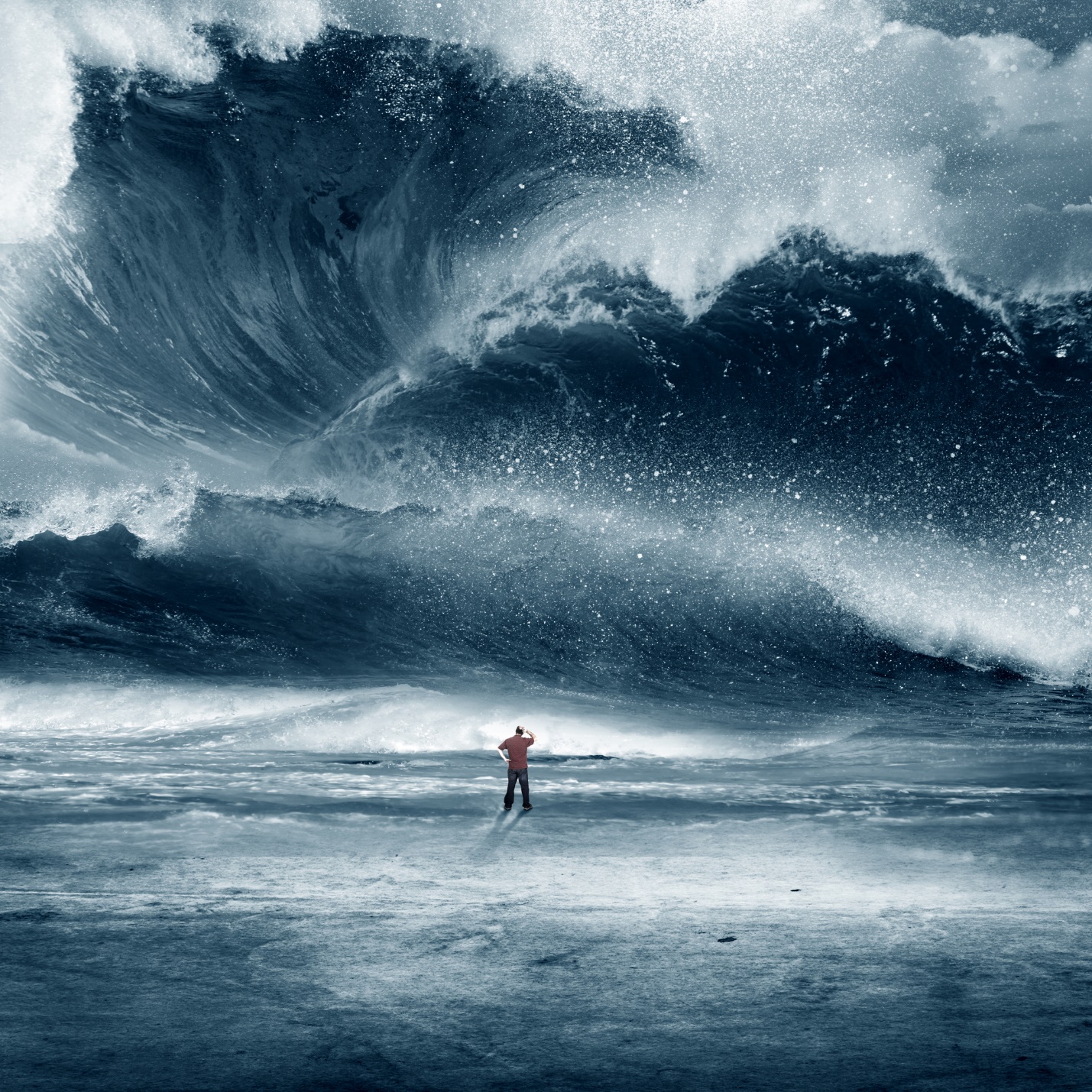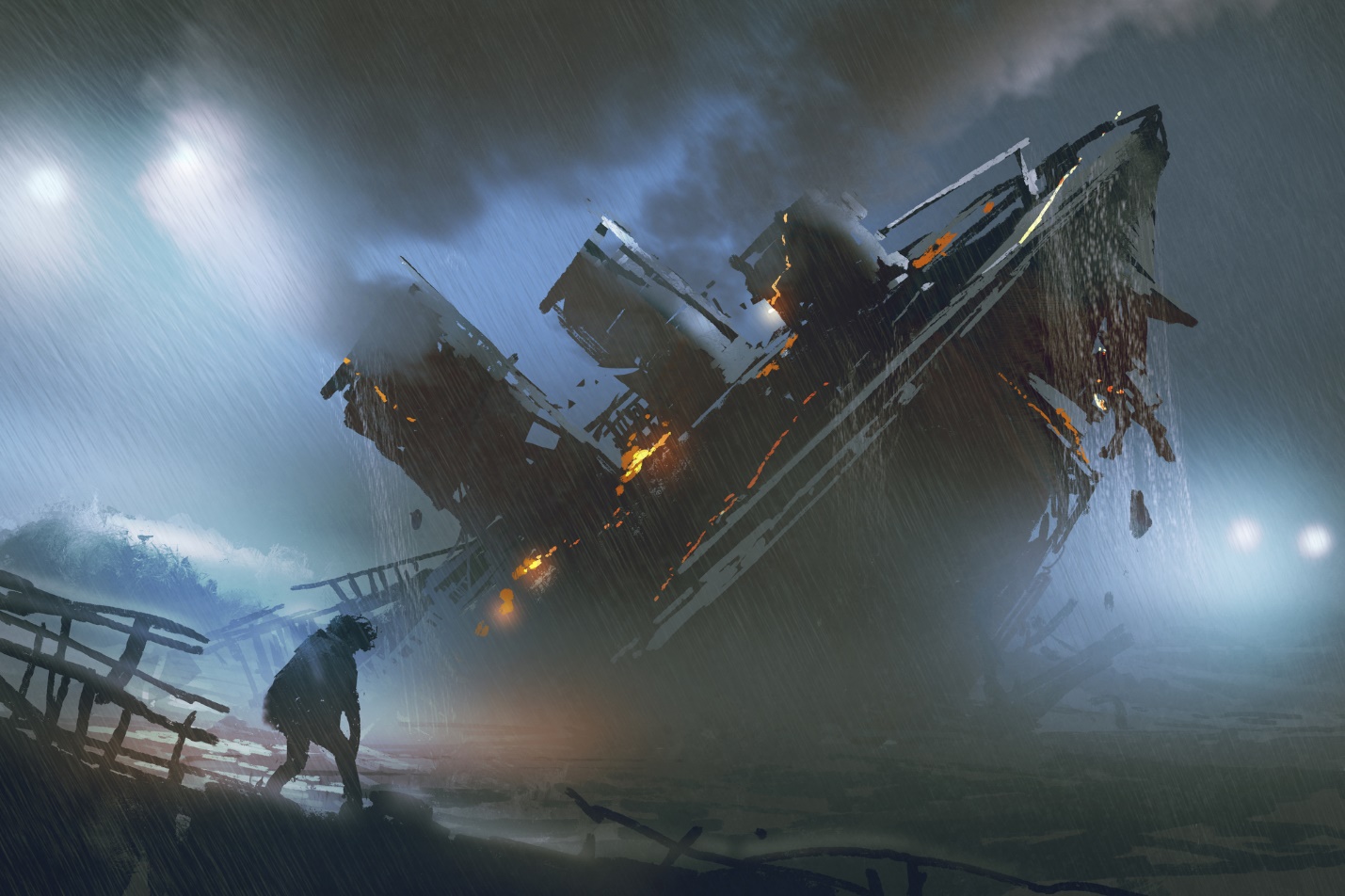BP39

Dry docking is the event that occurs every five years or so in the life of a ship. The vessel is steered into a flooded compartment and then a gate is closed—kind of like a lock—and all the water is pumped out leaving the ship high and dry. Sitting on blocks or some other material, the whole ship—especially the underside that is usually covered by water–is now exposed for examination.
Dry docking enables the ship’s manager to assess the condition of the ship’s hull and the machineries that steer and propel the ship through the water.
A ship might remain in dry dock for days or weeks depending on how many repairs are required. The focus might be on general maintenance, hull damage, or propeller and rudder repair. If the Titanic had survived its tragic encounter with the iceberg, it would have been in dry dock for months while the long gash in its hull was being fixed.
So, if you hadn’t heard about it before, now you know that the dry dock is a place where ships are maintained and repaired.
But did you know that God uses dry docking for humans?
Sometimes as we journey through life, God interrupts our lives and navigates us into His Divine Dry Dock. Have any of you had that experience? I have.
The Divine Dry Dock (DDD) is not simply an extended quiet time or a weekend retreat. No, it is much more intensive than those experiences—in a totally different league. The DDD entails a time out from life. You are removed from the waterways of your familiar life journey and transferred into a dry container that feels very foreign and cold.
Just as a ship looks naked when in dry dock, so humans feel terribly vulnerable and exposed when in the DDD. Oftentimes, they feel weak. Shamefully weak.
While everyone else is out cruising around like normal–strong and productive–the person in dry dock feels totally out of the flow of life and very unproductive. They are very alone. Some people feel like no one else in the whole world knows what they’re going through.
Do you remember as a child being confined in bed with an illness while your friends were talking and laughing and playing outside your window? God’s dry dock may feel like that—only far worse.

God’s dry dock experience, then, involves a summoning from your usual life into a season of being set apart—away from the rest of the world. It is an involuntary retreat, a retiring from life. It is painful and often totally unanticipated.
Some describe the DDD experience as a Severe Mercy: a season of suffering designed to grow you toward a positive goal that you are totally blind to at the moment.
The suffering can be intense.
It can feel like a waste of time. Enigmatic. Angering. The most familiar words during this season are, Why God?
I groan deeply as I think of those who are in dry dock even at this moment. Because I remember . . .
For some people, the DDD experience might be launched by a physical issue. The possibilities here are endless: cancer, MS, RA, chronic pain, major traumatic injury, etc. For others, it will be a major loss such as the death of a loved one or a divorce. For several, it might be shame and isolation as a consequence of sin that blew up their lives. For many, it is an emotional/psychological breakdown.
God might summon a few men and women to a special path through this world that very few would choose–if any. The dry dock experience will be extremely painful for these individuals, but they will need Jesus so much that they rely on Him for their every breath. Not everyone is called to this path. But those who are summoned to it will love Jesus in a profound way in the midst of their anger, doubt, suffering, loneliness and weakness. Partly because there is nothing else for them to cling to.
If needing Jesus is the most precious commodity in the universe, these people are wealthy beyond measure.
Could it be true, as someone once said, that God brings breakdown to produce breakthrough?
There are some who will balk at what I am saying here. Some will even be angry or enraged. I can’t blame them. They will insist that God never allows or causes pain and suffering. To that, I simply say, does a surgeon ever use a sharp instrument in your life that will bring you suffering? Does a parent ever cause pain to her children by disciplining them? Does your personal trainer or your dentist or even your mentor bring pain into your life whether it be physical or emotional? Of course.
If these individuals are lovingly motivated, they will cause you to suffer for your good—to make you better.
We all remember the saying, No pain, no gain.
Could not a sovereign God do the same thing? The only difference is that the suffering God brings is designed for amazing eternal results.

Remember that your heavenly Father sees you not only in this blink-of-an-eye existence on earth. He sees your future after physical death and for all the trillions and trillions of years after that (of course, there will be no time in heaven as we know it here on earth). Do you believe that God might steer you into a DDD experience during your fleeting existence on this planet to give you a better life here but also in eternity?
One problem is that most of us view the pain God brings into our lives from a temporal perspective only. We forget that fifty or sixty or even seventy years of suffering (I think of Joni Eareckson Tada and groan again) in this world is a single flap of a hummingbird’s wing in eternity. But oh, how difficult the journey can be!
This post will not deal with the problem of pain. Rather, it will focus on the emotional breakdown that lands a person in God’s dry dock.
This variety of breakdown often involves anxiety or depression but may also revolve around bipolar issues, eating disorders, obsessions, addictions, etc.
One person I know, let’s call him Jim, experienced a panic attack out of the blue which was then followed by a system-wide collapse of his total psychological structure. Specifically, the panic attack ushered in a disabling agoraphobia that left him feeling tortured every time he left the emotional safety of his house.
Like a huge tsunami, this wave of anxiety appeared out of nowhere and wreaked havoc on Jim’s ego strength that up to that point had made life relatively easy for him. Dike after dike (similar to those that have been built in the Netherlands to keep the ocean from flooding the land) that had provided Jim with psychological resilience were battered by the mammoth wave and destroyed. He was quickly flooded by fear and paralyzing anxiety. He had to quit his job and stop driving his car. He couldn’t even see his friends.
Life as he knew it was interrupted. Suddenly, he was in the dark. He didn’t know how he got there, why he was there, or how he was going to get out. The needle on his life compass began spinning around and around like the fan of a farm windmill in a storm.
One day he was cruising around, sailing the high seas with hardly a care in the world; the next, he was taken out of life. A bullet to his chest would not have been more disabling.
Confused, scared, alone and tortured, He found himself in God’s dry dock. Of course, he didn’t even know where he was at first. He was completely disoriented. Where are you, God, he cried out, and how did you leave me here alone?
He didn’t know what was up or what was down.
For months, he was angry with God because it felt to him like God had forgotten him. It took him half a year to even formulate the thought in his brain that maybe the Holy Spirit was speaking to him in a loving way through his suffering. Some people never arrive at that thought. They are so disillusioned and bitter.
They do therapy and medication (one or both which might be needed) but never hear what God is saying to them.
Jim had always believed prior to his DDD experience that pain and love were opposed to each other. Love meant protection from all suffering while suffering meant that love was absent.
Sometimes nothing will get our attention and put us on a journey toward growth except for a breakdown that summons us into the DDD. (Fortunately, God never gives us more than we need to get us into dry dock. For some of us, however, it takes a lot to get our attention.) We are so intent on building our own kingdoms or performing so we’ll feel like we’re good enough for God and others or running from something (like Jonah did) that we will not stop to rest or listen.

So, God interrupts us. It’s the most loving thing He could do.
Sometimes the experience involves a slowing down of our lives.
Often, it’s a full stop.
Why would God do that to us? How could a good Father allow such suffering?
He always has a reason: to teach us how to rest our bodies and our souls instead of becoming addicted to hurry; to learn how to focus on people instead of money; to grow in our ability to love Him and others; to deter us from a selfish, sinful direction we are pursuing that will result in years of suffering for bad reasons.
Sometimes, God has a repair to make in the hull (heart) of our lives. Other times, He knows we need a significant upgrade or a life-changing spiritual retrofitting.
One thing you can count on: God’s dry dock is always about making us more like Him. For joy. For intimacy. For peace. God’s motive is always to grow us for our good.
Jim’s life collapsed because his childhood self had developed poorly–like an inverted pyramid. His self wasn’t solid. It was not resting on a stable base, but on its point. His psychological self was shaky. Tipsy. Wobbly.

God knew that Jim’s core self was prone to disintegration and needed to be rebuilt or he would struggle with stress, conflict, delay of gratification, narcissism, poor conflict resolution, and personalizing the behaviors of others for the rest of his life. His immaturity would blow up every relationship he had, both now and in the future. His irritability and bitterness would poison his heart toward others and toward Jesus.
So, God summoned him to His dry dock for major restructuring.
Jim had become a believer in Jesus in his early twenties and his life had immediately changed in an amazing way. In fact, he described the next four years of his life as heaven on earth compared to his pre-Christ days.
But then the anxiety torpedo blew a gaping hole in the hull of his self and he began taking on water to the point that he began sinking. Soon, he was disabled—dead in the water.
He didn’t ponder the idea right away, but later he realized that when he became a Christ follower, Jesus had not erased his past which had been characterized by physical abuse from his father and emotional absence from his mother. These wounds and deficits had to be addressed as part of His journey toward Christlikeness.
But it was far more than only addressing what others had done to him.
In his attempt to deal with the dysfunction of his family when he was a child, Jim had developed numerous coping skills that were not healthy. The coping skills that help someone like Jim survive in childhood usually are not functional in adulthood. What floats the boat of a child often sinks it when he gets older.
Some of Jim’s young coping skills included pretending that he was fine, swallowing his emotions, always being strong and never needing anyone, using large amounts of food to comfort himself since emotional soothing was not available, escaping into books, turning to pornography (beginning at age ten) to meet his intimacy needs, and always using humor to deflect from his emotional pain. (How many comedians make a living by telling jokes about their own suffering?)
In effect, Jim shut his true self in the engine room of his ship and kept everyone at arm’s length. Instead, he lived out of a false self that tried to do everything perfectly so he would never be criticized and everyone would be pleased with him. When Jim began to hide his true self, he stopped growing. He was not open to correction or healthy conflict. He hated anger and being told he was bad, and he was quickly angry with people who didn’t value him or his efforts.
No correction + no conflict = no growth. Jim remained safe but emotionally young in the world he controlled.
Of course, when Jim did not use the Well of intimacy to communicate his needs and emotions, he was left to experience the Leakage of anxiety and resentment. Instead of obeying Ephesians 4 where the word of God told him to be angry but sin not, he trained himself not to be outwardly angry but harbored fantasies of hatred and revenge in his heart. Don’t be angry but sin, was his internal commandment.
Few of us doubt that these coping strategies are not going to work well in the world of adult relationships. But how many of us hold on to young (sinful) coping skills we continue to practice to our detriment and to that of those around us?

God knew the false self that Jim had built (the one that practiced self-sufficiency and performance-based value) needed to be deconstructed. In preparation for this major dry dock episode, God gave Jim a wonderful beachhead of four encouraging years as a new believer that he could recall when the tsunami inundated everything.
Then Jesus shed a tear and said, “Hang on to me, Jim. The next decade is going to be painful and disorienting as I call you into dry dock. I’m going to send a strong wave of mercy (that will feel like anything but mercy) into your life that will topple your inverted pyramid self. When you’ve been tipped over, you will be resting on the side of the pyramid—a rudimentary foundation that is much stronger than the tip. Then I’ll begin a rebuilding project in you that will last for years but produce eternal results.
“You won’t even know what’s going on for the first eighteen months, my child. You will question if I even love you. But I will reveal the rationale for my work in you at the perfect time. Will you trust me? Not at first. You will see me as the uncle who abused you or the mother who repeatedly forgot to pick you up after school and left you at the mall at age five. But later you will come to know my faithfulness and your faith in me will be rock-solid.
“You must move toward me and not away from me. You must allow me to deconstruct your false self or you will deconstruct your relationship with me. Disillusionment is common in dry dock, so I will send you reminders of My love. Be careful not to dismiss them with anger and resentment.”
God taught Jim many things in the DDD that he would never have learned out sailing around on the high seas of life. This season of suffering was painful but so beneficial because God was speaking to him one on one. Face to face. Not to the whole flock but to one sheep.
How amazing that God knows us by name and grows us individually. He doesn’t hoist a growth template on us that fits everyone or insist on a single unwavering feeding schedule that every sheep must comply with as part of the herd. He knows us and grows us as individuals.
The most critical lesson Jim learned in the DDD was that he was self-sufficient and needed no one. Not even God, really. This awareness took Jim almost a year to realize and then nine years to reverse the habit with God’s help. Trust in self which actually reflects a distrust in God is a tough nut to crack.

The truth is that because of the Fall and our inherent sinfulness, all of us have a self that is inverted. We can’t primarily attribute it to bad parenting, although that might be a factor. Most important is our own sin—our faulty coping skills: addictions, blame, hatred, pride, disobedience and bitterness.
So, God steers us into His dry dock as he did with Jim to grow a new self in us that is right-side up.
God is intent on repairing major hull (heart) damage within us that has resulted from the Fall, from being sinned against, and from our own sinful choices. He will initiate a paradigm shift within us that will totally transform how we see Him, others and our own selves.
We will increasingly trust and obey Jesus as our Lord and best friend—even if the path to that trust and obedience is through suffering. We will learn to love other humans with a sacrificial love. We will develop a habit of looking deeply into our own hearts instead of judging and blaming those around us.
God might choose to repair the propellers that move us forward in life or maybe He will remove the propellers and the rudder all together and totally retrofit us with azipods that will operate with less grumbling and more efficiency and free up more space in the engine room of our hearts for the love He wants to cultivate within us.
Does everyone go through a dry dock experience? Maybe not as severe as the one Jim experienced. But I believe that everyone who follows Jesus will experience His loving discipline and growth as they mature in their spiritual walk and so will end up in God’s dry dock at one time or another.
After you have surrendered to Jesus, He wants to transform you into the best version of you that is most like Him. Maybe what you learn during your dry dock experience will change the world. Maybe ten thousand people will end up in heaven because of it. Certainly, you will experience more love, peace and trust and usually sleep better at night and have a better marriage or be a better servant to your friends and family.
If your stay in dry dock lasts a while, you might feel behind others and fear that you’ll never catch up. But don’t be afraid, God has a perfect plan for your life and it is different than the path He has for everyone else.
If God doesn’t put you in His dry dock, you will suffer in other ways that will not result in eternal good for yourself and others.
I remember when I went into a surgical center for a procedure and happened to read a line in the consent form that announced, Medicine is not an exact science. Not exactly the most comforting thing to read at that moment. But I didn’t worry because I knew the Great Surgeon, and His motto reads, My way is perfect.
I believe it is true that life is going to involve pain and suffering one way or the other. We can experience the random suffering that comes by doing life alone, or we can experience the calculated suffering of the dry dock that is designed to repair, grow, mature, and better us for the journey ahead.

Besides, isn’t it better to spend seasons in the DDD than to take on water and eventually sink into the watery depths of a life captained by oneself instead of Jesus?
For this light momentary affliction is preparing for us an eternal weight of glory beyond all comparison ~ 2 Corinthians 4:17
And after you have suffered a little while, the God of all grace, who has called you to His eternal glory in Christ, will himself restore, confirm, strengthen, and establish you ~ 1 Peter 5:10
